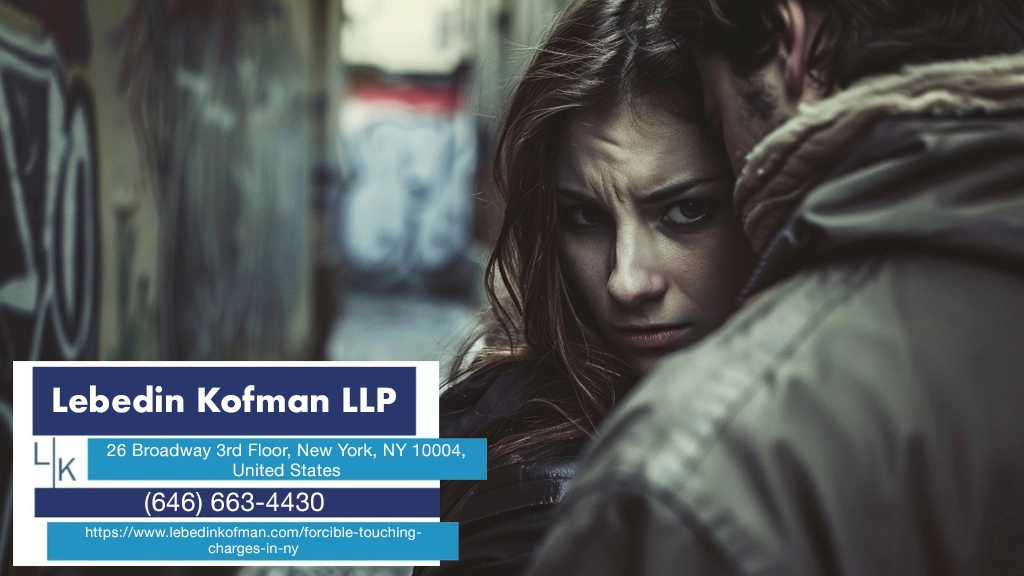What Constitutes Forcible Touching Under NY Law
Forcible touching allegations can derail your life in an instant. Under New York Penal Law § 130.52, this offense occurs when someone intentionally touches the intimate parts of another person without legitimate purpose, either to degrade them or for sexual gratification.
As a criminal defense attorney in NY, I can tell you that the state takes forcible touching charges very seriously. At Lebedin Kofman LLP, our defense attorneys understand the serious consequences you’re facing, including potential jail time, and long-term damage to your reputation. We are committed to navigating the legal system with you and fighting to protect your rights at every step. Contact us today at (646) 663-4430 to schedule a complimentary consultation.

What many people don’t realize is that while it’s classified as a Class A misdemeanor, the repercussions extend far beyond just a year in jail. The statute specifically targets unwanted physical contact on public transportation, a response to the unfortunately common occurrences on NYC’s subway system.
The law breaks down like this: prosecutors must prove you touched someone’s intimate parts:
- Intentionally (not accidentally)
- Without any legitimate purpose
- For degrading the person OR satisfying sexual desire
The Real-World Consequences You’re Facing
The immediate legal penalties include:
- Up to 1 year in jail
- 3 years probation
- Fines up to $1,000
- Permanent criminal record
Depending on circumstances, particularly if the victim is a minor or you have prior convictions, you might face sex offender registration requirements. This creates a cascade of problems affecting:
- Employment opportunities (goodbye career)
- Housing options (many landlords screen for this)
- Reputation in your community
- Immigration status (non-citizens face deportation risks)
How Forcible Touching Differs From Other Sex Crimes
The legal landscape of sex offenses can be confusing. Forcible touching sits in a particular position:
Sexual Abuse (Third Degree) vs. Forcible Touching
Sexual abuse requires “sexual contact” while forcible touching focuses on the intent behind the touching. The distinction often comes down to nuanced interpretations of the defendant’s motives.
In People v. Guaman, the court analyzed this distinction extensively, highlighting that the nature of the contact alone isn’t determinative, it’s the purpose behind it that matters.
Public Lewdness vs. Forcible Touching
Public lewdness involves exposing intimate parts in public, while forcible touching requires actual physical contact. Many cases involve charges for both when the alleged incident includes multiple elements.
Defending Against Forcible Touching Allegations
As someone who’s stood beside countless clients facing these charges, I can tell you there’s no one-size-fits-all defense. Each case requires individualized strategy, but several approaches consistently prove effective:
Challenging the Element of Intent
The prosecution must prove you acted with specific intent, either to degrade or for sexual gratification. This subjective element creates significant room for legal challenge. Was it:
- Accidental contact in a crowded subway?
- Misinterpreted innocent contact?
- A case of mistaken identity?
Consent Defenses
Establishing consent can be challenging but effective. Text messages, prior relationship evidence, and witness testimony can all play crucial roles here.
Credibility Challenges
Many forcible touching cases boil down to one person’s word against another’s. Inconsistencies in the accuser’s statements, delay in reporting, or motivation to falsely accuse become critical factors.
In a recent case, our client was exonerated when subway camera footage contradicted key aspects of the accuser’s timeline and description of events.
The #MeToo Impact on Forcible Touching Cases
The landscape for these cases has shifted dramatically. Prosecutors are under increased public pressure to take all allegations seriously (as they should), but this sometimes results in overzealous prosecution.
The reality is that false allegations do happen. A client recently faced charges based solely on an accusation from someone who later admitted to making the claim during a heated argument. Without thorough investigation and aggressive defense, his life would have been permanently altered.
Public Transportation: A Legal Hot Zone
The statute specifically addresses incidents on public transit, reflecting the legislature’s concern about these environments. The crowded conditions on NYC subways create situations where:
- Accidental contact gets misinterpreted
- Actual predators exploit the crowded conditions
- Limited witness visibility complicates cases
The MTA’s increased surveillance has changed the game for both prosecution and defense. Video evidence has become crucial, often making or breaking cases.
What To Do If You’re Charged
If you’re facing forcible touching allegations:
- Say nothing to police without counsel. The “just explain yourself” instinct has sunk countless cases.
- Preserve evidence immediately. Surveillance footage gets deleted, witnesses disappear, and memories fade. Time is critical.
- Understand your case is winnable. These charges, while serious, have numerous avenues for defense.
- Consider collateral consequences. Any plea deal must account for impacts on immigration, professional licensing, and potential sex offender registration.
The Bottom Line on Forcible Touching Charges
These cases exist in a challenging intersection of criminal law, where the stakes are extraordinarily high despite the misdemeanor classification. The good news? Strong defense strategies exist for those wrongfully accused.
The courtroom reality is that many forcible touching cases involve limited evidence beyond the accuser’s testimony. With proper investigation, legal knowledge, and courtroom experience, these allegations can be successfully fought.
If you’re facing these charges, remember that the system’s presumption of innocence exists for a reason. The right legal approach can make all the difference between a life-altering conviction and maintaining your freedom and reputation.
If you or someone you know is dealing with forcible touching charges, contact us today at (646) 663-4430 for a free consultation.
This article provides general information about forcible touching laws in New York. For advice about your specific situation, please consult with a qualified criminal defense attorney.